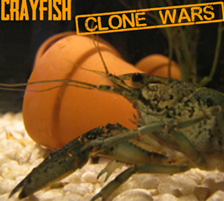The 2nd #SciFund Challenge is now live!
What is SciFund? It is "crowdfunding" to support scientific research. If you've heard of crowdfunding, it's probably because of sites like Kickstarter and RocketHub that have raised money for musicians to create albums, for programmers to create video games, and even for people to make feature-length films, among a lot of other projects, mostly in the artistic arena. SciFund is an effort to do the same thing for scientists--allowing them to raise money for small(ish) projects from individual donors.
But you want details, right?
The SciFund Challenge is asking the general public to open their wallets for small-amount donations organized through the RocketHub website, which handles the administration of the project (and takes a small cut of the proceeds). You can think of this as the model charities have always used (bundling lots of donations to do good works), but with an internet/social media twist.
As in 2011 when the #SciFund Challenge started, scientists from a wide variety of disciplines (ecology to psychology to astronomy) have signed on to crowdfund their research. And I've decided to join them in SciFund 2!
 My project is called Crayfish Clone Wars and you can watch video I made for the project on YouTube: Crayfish Clone Wars video.
My project is called Crayfish Clone Wars and you can watch video I made for the project on YouTube: Crayfish Clone Wars video.
So, I can hear you wondering, what exactly are you planning to do?
I've worked in the past with two types of decapod crustaceans, crabs (2 species) and lobsters. But the decapods also include shrimp and crayfish and to broaden my exposure to this fascinating group of creatures, I've decided to take on a research project studying the unusual "clone" crayfish Marmorkrebs (also called the marbled crayfish). This crayfish is unique among the ~15,000 or so decapod crustaceans in that it is the only one that can reproduce parthenogenetically. As a result, female Marmorkrebs reproduce without sex, and produce only daughters that are genetically identical to the mother.
But how identical is identical?
Turns out this is not as easy of a question as you might imagine. It's taken us a long time to prove that even human monozygotic (identical) twins are really genetically (mostly) identical. We don't really know how genetically identical these parthenogenetic crayfish are. So, this means that we don't really know how different that different lines of Marmorkrebs are (those that are not descended, at least to our knowledge, from the same ancestor). In Crayfish Clone Wars, I will use DNA sequencing to minutely examine genes from the different "lines" and see how the genes differ (that is, I will pit clone versus clone in a "Clone War" at the DNA level!). And since we have only a few DNA sequences from the marbled crayfish in the entire GenBank database, every gene we study brings us one step closer to the goal of a Crayfish Genome Project.
While this subject may seem esoteric, there is so much we don't know about crustacean biology, and crayfish are particularly understudied at the genetic level amongst the decapods (where most research goes to crabs, lobsters, and shrimp, depending on your part of the world). Every gene we study in crustaceans helps us to understand these animals better. I'm not going to promise that we're going to cure cancer with this information, but I think the discovery of new genes and how they work in new organisms is every bit as worthy of study.
What your contribution will support:
- Sample collection from Marmorkrebs (marbled crayfish) individuals.
- Sample processing (DNA and/or RNA isolation, reverse transcription, gene cloning, quantitative polymerase chain reaction, preparation for and carrying out of conventional Sanger sequencing and/or next-generation sequencing (NGS) methods).
- Bioinformatic sequence analysis.
- Deposition of sequences in the GenBank gene database, contributing to knowledge of genetics in crustaceans and other organisms.
What you will receive for your contribution:
- Periodic updates via my blog and by email on the status of work.
- Rewards that are listed on the RocketHub project page and that commemorate your contribution in fun ways
I originally released a "teaser" video for Crayfish Clone Wars in the month of April, to whet your appetites, which you can view here: Teaser video for Crayfish Clone Wars
If you would consider a donation to my project, I would be grateful for your help. I'm raising only $780 to fund the modest costs associated with the collection of tissues or blood (hemolymph) from the crayfish and purification of genes from those samples. Because of the small pricetag for my project, if I can get everyone reading this to donate only $1 or $5, I can easily reach my goal by the end of the SciFund Challenge on May 31st, 2012.
Would you please help? Thank you very much!
If you would like to know more about me, have a look at the about me page for my blog, By Way of Science.
